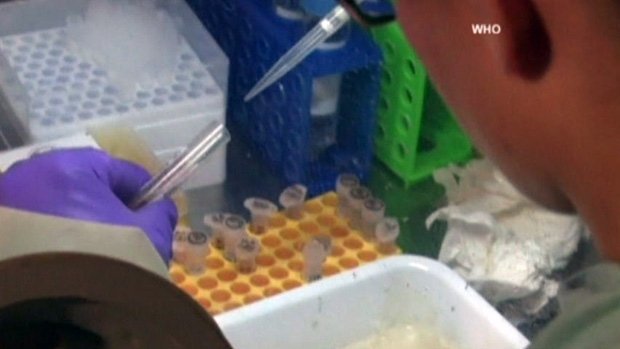
Canada will donate up to 1,000 doses of an experimental Ebola vaccine to help battle the disease’s outbreak in West Africa.
The announcement comes after the World Health Organization (WHO) said it was ethical to use untested drugs on Ebola patients.
However, experts say supplies of both the vaccine, and experimental drug ZMapp are limited and it could take months to develop more supplies.
More than 1,000 people have been killed by the current outbreak.
Canada says between 800 and 1,000 doses of the vaccine, which has only been tested on animals, will be donated to the WHO for use in West Africa.
However, it will keep a small portion of the vaccine for research, and in case it is needed in Canada.
The current outbreak has infected people in Guinea, Sierra Leone, Liberia and Nigeria.

Dr. Gregory Taylor, deputy head of Canada’s Public Health Agency, said he saw the vaccines as a “global resource”.
He said he had been advised that it would make sense for health care workers to be given the vaccine, given their increased risk of contracting the disease.
Even if Canada releases most of its existing doses, experts warn it could take four to six months to make a quantity large enough to have any real impact at preventing the illness.
On Tuesday, the WHO said that in light of scale of the outbreak and high number of deaths, it was “ethical to offer unproven interventions with as yet unknown efficacy and adverse effects, as potential treatment or prevention.”
Last week the WHO declared the Ebola outbreak was a global health emergency.
Liberia says it is getting an experimental drug, ZMapp, after requests to the US government.
However, the WHO said there were only 12 doses.
ZMapp maker Mapp Biopharmaceutical said on Tuesday: “The available supply of ZMapp has been exhausted. We have complied with every request for ZMapp that had the necessary legal/regulatory authorization.
“Drug has been provided at no cost in all cases.”
ZMapp has been used on two US aid workers, Dr. Kent Brantly and Nancy Writebol, who have shown signs of improvement, although it is not certain what role the medication played in this.
A Roman Catholic priest, infected with Ebola in Liberia, who died after returning home to Spain is also thought to have been given the drug.
Ebola’s initial flu-like symptoms can lead to external hemorrhaging from areas like eyes and gums, and internal bleeding which can lead to organ failure. Patients have a better chance of survival if they receive early treatment.
[youtube 11B1NPvvYnE 650]